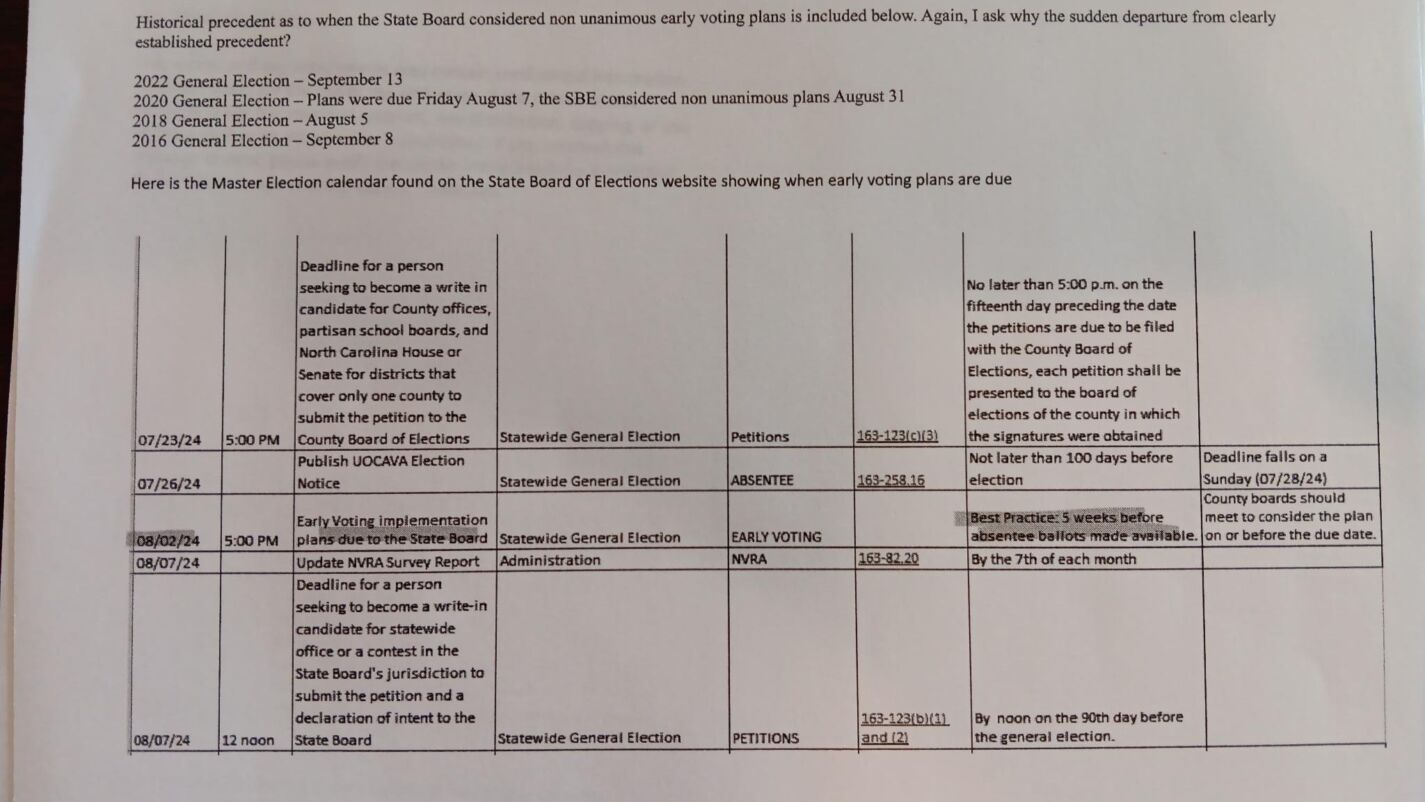The North Carolina State Board of Elections stealthily altered planning documents on Tuesday morning less than an hour after a complaint from the state Republican Party alleging the board is playing politics with modified early voting site plans that show ‘blatant partisanship.’
The master election schedule for 2024 has indicated August 2 is the ‘best practice’ deadline for counties to submit early voting site plans, five weeks before absentee ballots are sent out. However, Karen Brinson Bell, the executive director of the NCSBE, notified counties at the beginning of April that early voting plans are now due by May 7, a departure from the customary August deadline. The Board offered no explanation for the sudden shift of scheduling deadlines.

In a letter sent Tuesday morning, the state Republican Party slammed the three-month change as ‘highly unusual and questionable.’ The party noted in the letter that the earliest date in which counties have been asked to submit Early Voting Plans from 2016 to 2022 was August 5, with one deadline extending into mid-September.
“Unfortunately, a recent directive from the North Carolina State Board of Elections (NCSBE) earlier this month calls their motives into question,” said NCGOP Chairman Jason Simmons. “Based upon the actions taken, I am left to believe the NCSBE is engaging in blatant partisanship of historical fashion in an attempt to circumvent pending litigation.”
The letter identified the NCSBE’s own published master calendar marking the date for submission as August 2 and noting this date as a “best practice.”
Shortly following an NCGOP press release that was published Tuesday morning, the NCSBE’s 2024 master calendar was modified to reflect the updated deadline instructed in Bell’s email. Screenshots and timestamps show that the calendar was changed to list the new May 7 deadline, and ‘best practice’ was removed entirely.


The North Carolina State Board of Elections did not respond to numerous information requests from both the Carolina Journal and Andy Jackson, Director of the Civitas Center for Public Integrity at the John Locke Foundation. Jackson agreed that the Board has offered no legitimate reason for making the change, which imposes a burden on county boards.
“I am concerned about this change in the schedule,” said Jackson. “The State Board has traditionally not asked for the list of early voting locations until midsummer, and their master calendar had listed August 2 as the deadline for counties to submit early voting plans. They did not change that date on the calendar until 11:27 this morning after public complaints began to arise.”
With a downloaded copy from Monday, Jackson confirmed that the election schedule spreadsheet showed August 2 as recently as Monday.
The new deadline means local election officials across the state must prepare plans for early voting sites nearly three months ahead of the usual timeframe, which can bring challenges for rural counties that are also dealing with early voting for the statewide runoff elections. Tuesday was the deadline for counties to secure taxpayer-funded voting sites, which could be a problem for county boards that might not know their budgeted amounts for early voting sites, funded by their county commission.
Hoping for an explanation on the change, Patrick Wike, the Alexander County Elections Director, suggested the State Board look no further as to why 58 elections directors have left the elections profession.
“Blindsiding counties with adopting early voting plans 3 months ahead of established time tables in the midst of conducting a May 14 second primary is incredibly disappointing,” said Wike. “Historical precedent as to when the State Board considered non-unanimous early voting plans is included below. Again, I ask why the sudden departure from clearly established precedent?”